|
Beecham’s Lonely Elijah
by Charles A. Hooey
Early in March 1918, it was business
as usual for an active Sir Thomas Beecham, especially at Drury
Lane where he had his hands
full guiding his opera company through its paces. That meant
an Aida on 2 March, The Marriage of Figaro on
the 6th and the double bill of Cavalleria Rusticana and Pagliacci on
the 7th, all of which he conducted. He was also busy recording.
On top of all this, he was due in his home city of Manchester
for a concert of Handel's music on 9 March.
When he arrived, he found there was no music for either orchestra
or chorus and planners had arranged a substitution. Fortunately
the Musical Times sent a critic who provided the following
review on 1 April 1918:
"The novelties this season have been
uniformly well-played, and this was no exception to the rule.
For the expected performance
of selections from Handel's Solomon on March 9, there
was substituted `Elijah', with Misses Caroline Hatchard
and Margaret Balfour, and Messrs Walter Hyde and Norman Allin
as soloists. If Sir Thomas Beecham aspires to the dramatization
of concert performances of certain oratorios he will find it
necessary to rehearse for these as fully as for opera. However
well choral-singers may know their parts, new ideas cannot
be instilled at one rehearsal. Some of his intentions were
realised,
but more were not, and very uneven results in actual performance
ensued. `Lift thine eyes' was heard `off,' but here
faulty pitch spoiled a good idea. Miss Gwladys Roberts as the
Youth
got as far away as she could short of going into the organ
loft, and here the lontano effect was realised. `Thanks
be to God' was
exciting; was it not rather meant to be noble? The most superb
singing was in the Sanctus, where, for once, we got a perfectly
blended and balanced double quartet. Miss Caroline Hatchard
and Mr. Norman Allin clearly revealed themselves as being
in the
true succession of oratorio soloists, if the future should
hold any hope for this type of choral work."
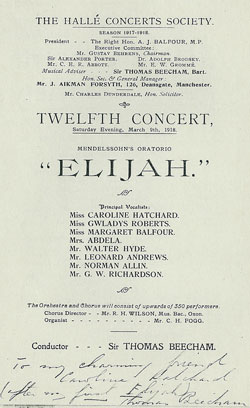 In
truth, there were rough edges due to a lack of rehearsal time,
but
under the circumstances it was amazing things went
so well.
Afterwards in high excitement, the maestro scribbled a note
on a programme (see left) and sent it to his soprano, "To
my charming friend Caroline Hatchard (after my first Elijah)." His
first Elijah! Imagine that! No mere mortal could prepare
and present a major work like this at more or less the drop
of a hat, but there was nothing ordinary about Tommy Beecham.
Afterwards
he hustled back to London and at Queen's Hall on 11 March
he led a concert of music by Beethoven, Elgar and Dvorak
together
with the first performance of Julius Harrison's tone poem, "Rapunzel".
All within nine days. In
truth, there were rough edges due to a lack of rehearsal time,
but
under the circumstances it was amazing things went
so well.
Afterwards in high excitement, the maestro scribbled a note
on a programme (see left) and sent it to his soprano, "To
my charming friend Caroline Hatchard (after my first Elijah)." His
first Elijah! Imagine that! No mere mortal could prepare
and present a major work like this at more or less the drop
of a hat, but there was nothing ordinary about Tommy Beecham.
Afterwards
he hustled back to London and at Queen's Hall on 11 March
he led a concert of music by Beethoven, Elgar and Dvorak
together
with the first performance of Julius Harrison's tone poem, "Rapunzel".
All within nine days.
In
this Elijah it was the vocalists who excelled so
let's meet them. The soprano was none other than Caroline
Hatchard (pictured),
now a familiar figure. She was born in 1883 the fourth of
five daughters of Lillian and George Hatchard. They grew
up within
sight and sound of the mighty warships anchored in Portsmouth
harbour. Although both parents were non-musical, four of
the girls were decidedly gifted, especially Caroline whose
beautiful
voice was a source of wonder to all. She began in opera in Hänsel
und Gretel, Tannhäuser, Faust, La Traviata and Armide,
and in all four operas of 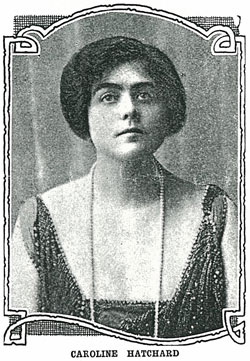 Wagner's Ring when it was
given in English at Covent Garden early in 1908. Always eager
to support
English composers, she sang in such diverse works as Liza
Lehmann's `In a Persian Garden,' Coleridge-Taylor's
`Hiawatha'
and `A Tale of Old Japan,' Parry's `War and Peace,'
Sullivan's `Golden Legend' and Elgar's `Spirit
of England.'
In oratorio, judge for yourself from these words by the Manchester
Guardian's fire-breathing Samuel Langford after a Messiah in
1926: "It was one of those fortunate evenings when we
may think the voice of Miss Caroline Hatchard the only soprano
voice
in England." Wagner's Ring when it was
given in English at Covent Garden early in 1908. Always eager
to support
English composers, she sang in such diverse works as Liza
Lehmann's `In a Persian Garden,' Coleridge-Taylor's
`Hiawatha'
and `A Tale of Old Japan,' Parry's `War and Peace,'
Sullivan's `Golden Legend' and Elgar's `Spirit
of England.'
In oratorio, judge for yourself from these words by the Manchester
Guardian's fire-breathing Samuel Langford after a Messiah in
1926: "It was one of those fortunate evenings when we
may think the voice of Miss Caroline Hatchard the only soprano
voice
in England."
The
principal contralto on this occasion was Margaret Balfour (below)
who is believed to have taken her first breath in 1892. She
was
no stranger to Elijah, having appeared in it in Nottingham
in 1914. This city was also the scene of a Faust in
concert on 16 November 1916 in which Margaret doubled as
Siebel and Martha,
acquitting herself well in both, vastly different though
the music was. And Marguerite? Why she was the ever-charming
Miss
Hatchard!
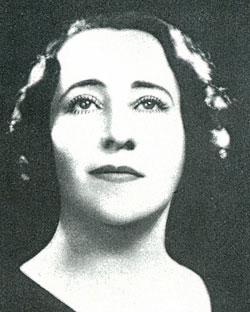 More opera in concert was in the cards on 2 March 1923 when,
with the Hull Harmonic Society, she sang in Aida as
Amneris with Carrie Tubb, Webster Millar and Frederick Ranalow.
By and
large, though, her calendar bulged with Handel and Bach. She
can be heard in the first recording of the latter's Mass in
B Minor from 1929 and in excerpts of a live Dream of Gerontius conducted
in 1927 by the composer, Sir Edward Elgar. In the Elgar, "her
`Farewell' is sung with gorgeous, velvety tone. The timbre of
the voice itself is of a type which is rarely heard these days." Both
works were reissued on CD by PEARL. She also recorded several
songs including two of Elgar's Sea Pictures and `The
sands o' Dee' by Clay. More opera in concert was in the cards on 2 March 1923 when,
with the Hull Harmonic Society, she sang in Aida as
Amneris with Carrie Tubb, Webster Millar and Frederick Ranalow.
By and
large, though, her calendar bulged with Handel and Bach. She
can be heard in the first recording of the latter's Mass in
B Minor from 1929 and in excerpts of a live Dream of Gerontius conducted
in 1927 by the composer, Sir Edward Elgar. In the Elgar, "her
`Farewell' is sung with gorgeous, velvety tone. The timbre of
the voice itself is of a type which is rarely heard these days." Both
works were reissued on CD by PEARL. She also recorded several
songs including two of Elgar's Sea Pictures and `The
sands o' Dee' by Clay.
In the 1940s, Caroline Hatchard was visiting her son Ewen in
hospital when a rather petite lady, crowned by a dazzling
headpiece, swept in and headed for the chap in the adjoining
bed. Looking
up, Caroline leapt up and embraced the newcomer who was of
course none other than a cheery Margaret Balfour. The old
campaigners happily reminisced while the patients, now totally
ignored,
looked
on in amusement.
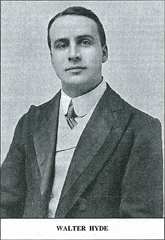 Tenor Walter
Hyde (1875-1951, pictured) was a hugely popular figure
in English music, then in his prime. He had been plucked
from musical comedy to sing Siegmund in the English Ring so
no wonder everyone was overwhelmed by how ideal he was. He
excelled in many operatic roles - the epitome of the Hyde
and Jekyll pairing
- almost but as there was no malice, not really so. He was
truly a chameleon, the heroic Siegmund one evening, the next
a comic
Pedrillo in Mozart's Abduction from the Seraglio.
Amongst his 173 records, "Winterstürme" from Die
Walküre sung in English, recalls his halcyon days.
It can be found in Pearl's Covent Garden CD collection and
on the
Hyde CD issued by Cheyne Records. Tenor Walter
Hyde (1875-1951, pictured) was a hugely popular figure
in English music, then in his prime. He had been plucked
from musical comedy to sing Siegmund in the English Ring so
no wonder everyone was overwhelmed by how ideal he was. He
excelled in many operatic roles - the epitome of the Hyde
and Jekyll pairing
- almost but as there was no malice, not really so. He was
truly a chameleon, the heroic Siegmund one evening, the next
a comic
Pedrillo in Mozart's Abduction from the Seraglio.
Amongst his 173 records, "Winterstürme" from Die
Walküre sung in English, recalls his halcyon days.
It can be found in Pearl's Covent Garden CD collection and
on the
Hyde CD issued by Cheyne Records.
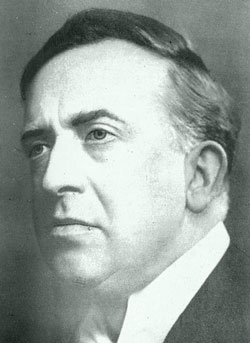 Basso Norman
Allin (1884-1973, pictured) was starting to make
his presence felt, having "arrived" at Covent Garden
as the Old Hebrew in Samson et Dalila on 15 October,
1916. For awhile he deferred to the famous Robert Radford,
but gradually
the two became equals and friends, even appearing together
as Fafner and Fasolt in The Ring and as Dodon and
Polkan in Rimsky Korsakoff's Golden Cockerel. Gurnemanz,
Ochs and Ramphis were Allin’s most frequent assignments.
Another great effort came with the British National Opera
as Arkel in
Debussy's Pelléas et Mélisande with
Walter Hyde and Maggie Teyte. His 168 records include Bartolo
in the
famous Glyndebourne recording of Le Nozze di Figaro. On
CD, Cheyne has more opera than Greenhorn with its array of
delicious ballads - "The Diver," "Asleep
in the Deep" and
the like. Basso Norman
Allin (1884-1973, pictured) was starting to make
his presence felt, having "arrived" at Covent Garden
as the Old Hebrew in Samson et Dalila on 15 October,
1916. For awhile he deferred to the famous Robert Radford,
but gradually
the two became equals and friends, even appearing together
as Fafner and Fasolt in The Ring and as Dodon and
Polkan in Rimsky Korsakoff's Golden Cockerel. Gurnemanz,
Ochs and Ramphis were Allin’s most frequent assignments.
Another great effort came with the British National Opera
as Arkel in
Debussy's Pelléas et Mélisande with
Walter Hyde and Maggie Teyte. His 168 records include Bartolo
in the
famous Glyndebourne recording of Le Nozze di Figaro. On
CD, Cheyne has more opera than Greenhorn with its array of
delicious ballads - "The Diver," "Asleep
in the Deep" and
the like.
Gwladys Roberts (1882-1957) was from Llanelli in Wales.
When still a young artist, Gwladys’s talent was noticed
by the legendary Australian soprano, Nellie Melba who urged her
to go to Italy to study, even offering to look after her living
expenses. Gwladys was a comely miss and perhaps her man frowned
upon the idea for she rejected the offer in favor of his hand
in marriage. The diva never spoke to her again. Well known as
a ballad singer and in oratorio, she occasionally had a turn
in opera. For the 1909 revival of the English Ring, she
was Grimgerde in The Valkyrie, a role she repeated in
German that summer and again in 1912. Among a few records she
left, look for "Violets" by Ellen Wright, "Still
as the Night" by Böhm and "Prayer to St.
Valentine" with Denise Orme.
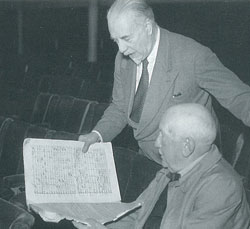 As for Elijah, I became curious about Beecham's involvement
with this music. Just how often did he conduct it? Seeking
an answer, I consulted the monumental
research of Messrs Parker and Benson and to my utter amazement, I found no
other performance! It seems he was set to conduct Elijah in
Liverpool on 20 March 1934 but at the eleventh hour he withdrew
in favor of the chorus master,
Dr. J. E. Wallace. Possibly, aware how versed choral societies were in this
music, Beecham felt his action would promote the local cause. As for Elijah, I became curious about Beecham's involvement
with this music. Just how often did he conduct it? Seeking
an answer, I consulted the monumental
research of Messrs Parker and Benson and to my utter amazement, I found no
other performance! It seems he was set to conduct Elijah in
Liverpool on 20 March 1934 but at the eleventh hour he withdrew
in favor of the chorus master,
Dr. J. E. Wallace. Possibly, aware how versed choral societies were in this
music, Beecham felt his action would promote the local cause.
With no other Elijahs, what can be made of Beecham's
apparent exhilaration in his words to Caroline? It must have
been the heat of the moment and in fact,
he didn't care for Elijah at all. The composer's other music fared better.
Felix Mendelssohn-Bartholdy was a precocious lad who by his wizardry at the
pianoforte brought hours of pleasure to the aging Goethe. In his teens, he
was blown away
by the imagery in Shakespeare's A Midsummer Night's Dream and in a burst
of creative energy, he penned an overture with a unique silken texture. It
became instantly popular. A few years later, he visited Fingal's Cave in the
Hebrides,
and again inspired by the magical enchantment of the Celtic atmosphere and
its legends, he completed incidental music for Night's Dream and an
overture to celebrate The Hebrides. No wonder this music appealed to British
audiences.
Intriguingly, Beecham used a Mendelssohn overture, in this case Ruy Blas to
open the first concert he gave in St. Helen's on 8 November 1899. He also ushered
Osbourne Edmundson on stage to play Mendelssohn’s First Piano
Concerto.
Once the maestro realized Mendelssohn’s overtures were sure-fire crowd-pleasers,
he began opening his concerts with A Midsummer Night's Dream and The
Hebrides - I counted nineteen times for each - along with Ruy Blas.
The Scherzo from "Dream" was also prominent, first in 1909 and
subsequently in at least eight other concerts. Later, he evinced an interest
in the overture "The Fair Melusine," introducing it on 14 September,
1947 at Southend-on-Sea and then giving it six more times in rapid order. For
meatier Mendelssohn, he selected from the following music:
Concerto in e for violin and orchestra, Op. 64
Beecham first offered this music on 4 May 1907 at a Queen's Hall Concert under
the patronage of HM Queen Alexandra with a pint-sized Hungarian prodigy, Franz
von Veczey, then a wiry 14 year old, as soloist. Under Beecham's baton, a parade
of famous and not-so famous fiddlers tackled the concerto: Mischa Elman (1908),
Margaret Fairless (1917), Erica Morini (1934), Adolph Busch (1935), Nathan
Milstein (1937), Samuel Dushkin (1938) and Lyndall Henrickson (1940 in Sydney,
Australia).
Albert Sammons played the finale when he auditioned for the post of First Violin
in Beecham's new orchestra, then faced the complete work in 1911. Beecham chose
to record the concerto late in September 1933 with Joseph Szigeti as soloist,
producing a piece of magic that George Szell viewed as classic. But in June
1949, he chose to record it again this time with Jascha Heifetz.
Symphony No. 3 in a, Op. 56 (Scottish)
TB must have had limited interest in this work for he gave it only in a Seattle
concert in 1943, again in London in 1947 and fittingly in Glasgow in 1948.
Symphony No. 4 in A, Op. 90 (Italian)
In 1830, at age twenty-one, Mendelssohn spent several months in Italy. The
experience found expression in the "Italian" Symphony that
he introduced during a concert in London on 13 May 1834. One hundred years
later, Beecham included
the Italian in concerts with the London Philharmonic Orchestra in Dudley,
and four days later in Queen's Hall, London. Over the next few years he offered
it in Manchester, at Covent Garden, in Liverpool and in Perth, Australia, culminating
in a recording session in New York on 15 June 1942. While in the US, he led
the symphony at Salt Lake City, Utah and in Seattle. He revived it on 3 November
1951 in Royal Festival Hall at a concert by the Royal Philharmonic Orchestra.
Then on tour, he gave it in Coventry, Bristol, Cardiff, Dundee and Blackburn.
Recording continued a week prior to Christmas and in May/June 1952.
Symphony No. 5 in d, Op 107 (Reformation)
During the summer of 1945, Beecham gave the "Reformation" high
priority while planning a concert tour with the London Philharmonic Orchestra.
He gave it first on 10 August for an audience assembled in Central Hall, Bristol,
then in Walthamstow on the 16th. Immediately Beecham became involved in recording
the Reformation making an initial stab at Kingsway Hall on 17th and
20th August. Three further sessions were needed to complete the task. Then
back to
live activity he offered the symphony at the Royal Albert Hall in London, in
Antwerp, Brussels, Glasgow and Edinburgh.
The Concertos for Piano and Orchestra, No. 1, Op. 25 and No. 2, Op 40.
Having included the First Concerto at his debut, Beecham waited until
29 January 1917 to give it again, this time at a Royal Philharmonic Concert
in Queen's Hall with ultra eccentric Vladimir de Pachmann as soloist. He returned
to this hall on 11 December 1932 for a Sunday afternoon concert with the London
Philharmonic, the highlight being the Second Concerto with Friedrich
Wuhrer at the piano.
The crowning moment for this composer insofar as Beecham was concerned came
during the Mendelssohn Commemoration Concert at Drury Lane on 2 November 1947.
The maestro
lifted his baton to conduct the Fair Melusine overture, followed with
Nocturne from A Midsummer Night's Dream, the Scherzo, Octet in G Minor,
the Piano Concerto No. 2 with Albert Ferber and finally the Scottish Symphony.
With Elijah and Messiah arguably the most popular choral works
in Britain, every music society prided itself on their ability to deliver each
with ease. With Messiah, Beecham had sheared away centuries of obfuscation
to create a sprightly version that re-awakened interest in this hoary work.
Not so with Elijah. He had been conducting for twenty years before he
came face-to-face with this music and then only because he was maneuvered into
the
task in Manchester.
In Chicago on 20 March 1960, at almost his last hurrah, he led off with The
Hebrides overture. The great feast of music was shared by thousands through
the magic of television. So, wonder of wonders, Mendelssohn was on his mind
at the outset of his career and at the end! But what about poor Elijah?
I asked onetime Beecham associate Denham Ford to explain the conductor’s
apparent disinterest in Elijah. His reaction: "One can speculate
forever on why Beecham did not conduct the work more often. Perhaps he regarded
it as a bit of Victoriana. It has rarely been performed by professional bodies
here though amateur choirs still feature it occasionally."
While no Beecham Elijah exists, it is possible to hear the first recording
(1930) with Isobel Baillie, Parry Jones, Harold Williams, Clara Serena & the
BBC National Orch. led by Stanford Robinson. It occupies Divine Art CD 27802.
It is also possible to hear TB's principal artists on CD in other music:
Bach: Mass in B Minor + other Bach with Elisabeth Schumann, Friedrich
Schorr, Walter Widdop and Margaret Balfour; cond. Albert Coates, recorded Mar/Apr
1929 PEARL GEMM CDS 9900*
Elgar: The Dream of Gerontius excerpts with Margaret Balfour, Steuart
Wilson, Herbert Heyner; cond. Sir Edward Elgar, Royal Albert Hall (live) 26
Feb. 1927 OPAL CD 9810*
Norman Allin "The Mighty Deep" Greenhorn CD 0005
Norman Allin Cheyne Records, CHE 44398
Caroline Hatchard: The Creation aria + The Beautiful Land of Nod. RECORD
COLLECTOR CD TRC 18.
Walter Hyde Cheyne Records CHE 44420
Vladimir de Pachmann Pearl OPAL CD 9840
Franz von Vecsey Pearl GEMM CD 9498
The Szigeti/Beecham Recordings Pearl GEMM CD 9377; EMI Classics CDH-64562
Acknowledgements
Many thanks to Tony Benson, Denham Ford, Ewen Langford, Graham
Oakes and Wayne Turner for their helpful contributions. Uncredited quotations
are from The Musical Times.
Principal information source
Sir Thomas Beecham, Bart, C.H. (1879-1961)- A Calendar of Concert and Theatrical
Performances (1985) by Maurice Parker and Supplement by Tony Benson (1990).
|
|
|














 In
truth, there were rough edges due to a lack of rehearsal time,
but
under the circumstances it was amazing things went
so well.
Afterwards in high excitement, the maestro scribbled a note
on a programme (see left) and sent it to his soprano, "To
my charming friend Caroline Hatchard (after my first Elijah)." His
first Elijah! Imagine that! No mere mortal could prepare
and present a major work like this at more or less the drop
of a hat, but there was nothing ordinary about Tommy Beecham.
Afterwards
he hustled back to London and at Queen's Hall on 11 March
he led a concert of music by Beethoven, Elgar and Dvorak
together
with the first performance of Julius Harrison's tone poem, "Rapunzel".
All within nine days.
In
truth, there were rough edges due to a lack of rehearsal time,
but
under the circumstances it was amazing things went
so well.
Afterwards in high excitement, the maestro scribbled a note
on a programme (see left) and sent it to his soprano, "To
my charming friend Caroline Hatchard (after my first Elijah)." His
first Elijah! Imagine that! No mere mortal could prepare
and present a major work like this at more or less the drop
of a hat, but there was nothing ordinary about Tommy Beecham.
Afterwards
he hustled back to London and at Queen's Hall on 11 March
he led a concert of music by Beethoven, Elgar and Dvorak
together
with the first performance of Julius Harrison's tone poem, "Rapunzel".
All within nine days.  Wagner's Ring when it was
given in English at Covent Garden early in 1908. Always eager
to support
English composers, she sang in such diverse works as Liza
Lehmann's `In a Persian Garden,' Coleridge-Taylor's
`Hiawatha'
and `A Tale of Old Japan,' Parry's `War and Peace,'
Sullivan's `Golden Legend' and Elgar's `Spirit
of England.'
In oratorio, judge for yourself from these words by the Manchester
Guardian's fire-breathing Samuel Langford after a Messiah in
1926: "It was one of those fortunate evenings when we
may think the voice of Miss Caroline Hatchard the only soprano
voice
in England."
Wagner's Ring when it was
given in English at Covent Garden early in 1908. Always eager
to support
English composers, she sang in such diverse works as Liza
Lehmann's `In a Persian Garden,' Coleridge-Taylor's
`Hiawatha'
and `A Tale of Old Japan,' Parry's `War and Peace,'
Sullivan's `Golden Legend' and Elgar's `Spirit
of England.'
In oratorio, judge for yourself from these words by the Manchester
Guardian's fire-breathing Samuel Langford after a Messiah in
1926: "It was one of those fortunate evenings when we
may think the voice of Miss Caroline Hatchard the only soprano
voice
in England."  More opera in concert was in the cards on 2 March 1923 when,
with the Hull Harmonic Society, she sang in Aida as
Amneris with Carrie Tubb, Webster Millar and Frederick Ranalow.
By and
large, though, her calendar bulged with Handel and Bach. She
can be heard in the first recording of the latter's Mass in
B Minor from 1929 and in excerpts of a live Dream of Gerontius conducted
in 1927 by the composer, Sir Edward Elgar. In the Elgar, "her
`Farewell' is sung with gorgeous, velvety tone. The timbre of
the voice itself is of a type which is rarely heard these days." Both
works were reissued on CD by PEARL. She also recorded several
songs including two of Elgar's Sea Pictures and `The
sands o' Dee' by Clay.
More opera in concert was in the cards on 2 March 1923 when,
with the Hull Harmonic Society, she sang in Aida as
Amneris with Carrie Tubb, Webster Millar and Frederick Ranalow.
By and
large, though, her calendar bulged with Handel and Bach. She
can be heard in the first recording of the latter's Mass in
B Minor from 1929 and in excerpts of a live Dream of Gerontius conducted
in 1927 by the composer, Sir Edward Elgar. In the Elgar, "her
`Farewell' is sung with gorgeous, velvety tone. The timbre of
the voice itself is of a type which is rarely heard these days." Both
works were reissued on CD by PEARL. She also recorded several
songs including two of Elgar's Sea Pictures and `The
sands o' Dee' by Clay.  Tenor Walter
Hyde (1875-1951, pictured) was a hugely popular figure
in English music, then in his prime. He had been plucked
from musical comedy to sing Siegmund in the English Ring so
no wonder everyone was overwhelmed by how ideal he was. He
excelled in many operatic roles - the epitome of the Hyde
and Jekyll pairing
- almost but as there was no malice, not really so. He was
truly a chameleon, the heroic Siegmund one evening, the next
a comic
Pedrillo in Mozart's Abduction from the Seraglio.
Amongst his 173 records, "Winterstürme" from Die
Walküre sung in English, recalls his halcyon days.
It can be found in Pearl's Covent Garden CD collection and
on the
Hyde CD issued by Cheyne Records.
Tenor Walter
Hyde (1875-1951, pictured) was a hugely popular figure
in English music, then in his prime. He had been plucked
from musical comedy to sing Siegmund in the English Ring so
no wonder everyone was overwhelmed by how ideal he was. He
excelled in many operatic roles - the epitome of the Hyde
and Jekyll pairing
- almost but as there was no malice, not really so. He was
truly a chameleon, the heroic Siegmund one evening, the next
a comic
Pedrillo in Mozart's Abduction from the Seraglio.
Amongst his 173 records, "Winterstürme" from Die
Walküre sung in English, recalls his halcyon days.
It can be found in Pearl's Covent Garden CD collection and
on the
Hyde CD issued by Cheyne Records.  Basso Norman
Allin (1884-1973, pictured) was starting to make
his presence felt, having "arrived" at Covent Garden
as the Old Hebrew in Samson et Dalila on 15 October,
1916. For awhile he deferred to the famous Robert Radford,
but gradually
the two became equals and friends, even appearing together
as Fafner and Fasolt in The Ring and as Dodon and
Polkan in Rimsky Korsakoff's Golden Cockerel. Gurnemanz,
Ochs and Ramphis were Allin’s most frequent assignments.
Another great effort came with the British National Opera
as Arkel in
Debussy's Pelléas et Mélisande with
Walter Hyde and Maggie Teyte. His 168 records include Bartolo
in the
famous Glyndebourne recording of Le Nozze di Figaro. On
CD, Cheyne has more opera than Greenhorn with its array of
delicious ballads - "The Diver," "Asleep
in the Deep" and
the like.
Basso Norman
Allin (1884-1973, pictured) was starting to make
his presence felt, having "arrived" at Covent Garden
as the Old Hebrew in Samson et Dalila on 15 October,
1916. For awhile he deferred to the famous Robert Radford,
but gradually
the two became equals and friends, even appearing together
as Fafner and Fasolt in The Ring and as Dodon and
Polkan in Rimsky Korsakoff's Golden Cockerel. Gurnemanz,
Ochs and Ramphis were Allin’s most frequent assignments.
Another great effort came with the British National Opera
as Arkel in
Debussy's Pelléas et Mélisande with
Walter Hyde and Maggie Teyte. His 168 records include Bartolo
in the
famous Glyndebourne recording of Le Nozze di Figaro. On
CD, Cheyne has more opera than Greenhorn with its array of
delicious ballads - "The Diver," "Asleep
in the Deep" and
the like.  As for Elijah, I became curious about Beecham's involvement
with this music. Just how often did he conduct it? Seeking
an answer, I consulted the monumental
research of Messrs Parker and Benson and to my utter amazement, I found no
other performance! It seems he was set to conduct Elijah in
Liverpool on 20 March 1934 but at the eleventh hour he withdrew
in favor of the chorus master,
Dr. J. E. Wallace. Possibly, aware how versed choral societies were in this
music, Beecham felt his action would promote the local cause.
As for Elijah, I became curious about Beecham's involvement
with this music. Just how often did he conduct it? Seeking
an answer, I consulted the monumental
research of Messrs Parker and Benson and to my utter amazement, I found no
other performance! It seems he was set to conduct Elijah in
Liverpool on 20 March 1934 but at the eleventh hour he withdrew
in favor of the chorus master,
Dr. J. E. Wallace. Possibly, aware how versed choral societies were in this
music, Beecham felt his action would promote the local cause.